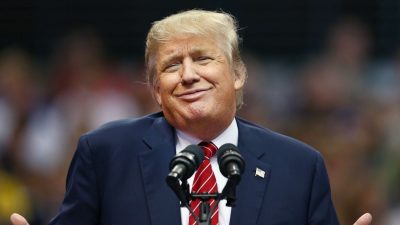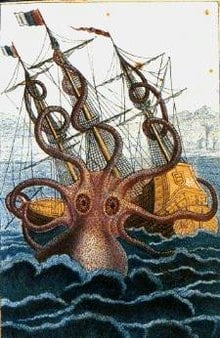Trump: Agent of Chaos (a.k.a. “The Kraken”)

Most people don’t understand Trump’s domestic and international intentions, believing that he and his team are “ruining everything” because they’re “hopelessly incompetent”, though the fact of the matter is that the President is an Agent of Chaos (a.k.a. “The Kraken”) and is deliberately working to undermine, tear down, and ultimately reform or outright recreate all existing institutions because he’s convinced that they no longer serve America’s interests and have instead been co-opted by its enemies, both internal and external.
“The kraken is a legendary sea monster of giant size that is said to dwell off the coasts of Norway and Greenland” (image left, source wikipedia)
It’s a common theme nowadays to read articles from people who claim to have deciphered the mindset of President Donald J. Trump, and this one admittedly falls into that category but is approaching the topic from a completely different angle. Instead of pretending that he has some kind of “master plan” that’s meticulously being implemented step by step for building a new world order, or promoting the opposite extreme that he’s hopelessly incompetent and is unwittingly making a mess out of whatever he touches, it’s better to conceptualize Trump as an Agent of Chaos – endearingly called “The Kraken” by his supporters – who’s deliberately destroying ev erything in his path because he no longer believes that it’s useful for his country.
erything in his path because he no longer believes that it’s useful for his country.
The word “country” is a loaded one that could imply any given number of things and actors, but in Trump’s context it refers to the general population and the long-term strategic interests of their government that’s tasked with maintaining their established way of life. The US expanded from a collection of thirteen mostly coastal colonies to a vast mainland empire that eventually conquered the world’s oceans and replaced the UK as the world’s strongest imperial power after the Second World War. No value judgement is being expressed here, as this is just a statement of fact, but it’s crucial to understanding Trump’s mindset.
His country overextended itself so much in the economic sense, especially since the end of the Cold War, that its domestic stability is now to a large degree dependent on external factors in far-flung corners of the globe, be it the developing markets in South America that its businesses sell to, the Congolese cobalt that almost all of its modern-day electronics (both civilian and especially military) depend on, or the Mideast oil that supports the petrodollar system, among many other examples. The imperial core is thus vulnerable to disruptions in the imperial periphery, which explains why the US always militarily intervenes in the “Global South” (“Third World”).

The Kraken, an illustration from the original 1870 edition of Twenty Thousand Leagues Under the Sea by Jules Verne
Most of these campaigns aren’t even directly relevant to immediately preserving internal stability and the American way of life, but are instead preemptive actions predicated on scenario extrapolations, whether in trying to thwart threats before they materialize or deprive competitors of strategic advantages such as reliable access to natural resources and trade routes in order to indefinitely prolong the US’ global hegemony. This policy was encapsulated in the 1992 Wolfowitz Doctrine and has defined the US’ post-Cold War global strategy ever since, and it basically seeks to protect unipolarity due to the belief that America is the “benevolent empire” that will herald in the “end of history”.
Although entirely self-serving, the strategy is structurally sound so long as the individuals tasked with executing it stay focused on promoting America’s geopolitical and economic interests, though the transnational liberal elite that soon rose to power all across the country after the end of the Cold War were more concerned about advancing their own personal and pecuniary interests at the expense of their country’s that they were supposed to support. Other globalist cliques emerged elsewhere in the world in doing the same thing to their people, which is using them as vehicles for their own self-enrichment and power-aggrandizement schemes.
Trump firmly believes that enough is enough, and that these folks mustn’t be allowed to fleece average Americans anymore through lopsided trade deals and pro-elite policies such as “open borders”, believing that the ideological grounds on which they’re argued are completely bankrupt and devoid of any serious substance. The category of individuals that are in favor of the aforementioned and have a stake in the existing order are considered to be Trump’s internal enemies, whether they work in the US’ permanent military, intelligence, and diplomatic bureaucracies (“deep state”) or are brainwashed “Cultural Marxists” rioting in the streets after being provoked by George Soros.
On the international front, the institutions that the US built for perpetuating its power have been co-opted by its competitors as part of a judo-like strategy to turn America’s own instruments against its interests, such as how the new National Security Strategy accuses China of doing with the post-Cold War global economic framework. Trump believes that it’s only a matter of time before this trend neutralizes the US’ weaponization of these institutions, and he fears that China’s One Belt One Road (OBOR) worldwide vision of New Silk Road connectivity will soon make it an uncompetitive player in the “Global South” regions that it’s come to depend on directly and indirectly due to its imperial economic overextension.
The end result of these two interconnected trends of institutional judo and OBOR is that the US will be pushed out of the strategic positions that enable it to sustain its global dominance and preserve the American way of life, with the implication being that internal stability within the imperial core will inevitably suffer as America’s adversaries asymmetrically take revenge on it for everything that it ruthlessly did over the decades in its drive to become the world’s preeminent power. All that the US’ competitors have to do in this regard is lessen the country’s access to the power structures, resources, and markets that it’s come to irreplaceably rely on in the contemporary world order that it ironically helped to create, with domestic destabilization bound to follow with time.
Believing that the current world system no longer sufficiently advances American interests ever since Washington lost control of its institutional tools, and that the eventual outcome of this increasingly multipolar state of affairs is that the US will in turn lose its global empire, Trump has decided to become the Agent of Chaos in bringing about its destruction. The strategy behind this “revolutionary” move is to place the US in the most advantageous position for reshaping the resultant world order afterwards, hoping that this will allow it to stave off the developing threats to its unipolar position and therefore ensure its continued imperial survival via a policy that has at times been described by various sources as a global “correction” or “restructuring”.
Another way of interpreting this move is to conceptualize it as the weaponization of chaos theory to achieve global structural change by means of Hybrid Wars, with the ultimate fallback plan being for the US to retreat to “Fortress America” in the resource-rich and theoretically autarkic Western Hemisphere that it plans to completely dominate in the event that the Eastern Hemisphere becomes uncontrollably and entirely engulfed in Hobbesian warfare. Although admittedly very cynical, this model of understanding is arguably the most accurate in explaining why Trump is deliberately fanning the flames in the world’s worst hotspots like North Korea and is systematically attempting to restructure global institutions such as the UN after undermining them from within through the appointment of “renegade” individuals like Ambassador Nikki Haley.
One of chaos theory’s central tenets is that the initial conditions of an event disproportionately determine its eventual outcome, so it’s with this in mind that Trump’s team believes that they can reshape the global order to a greater extent than their rivals if they take the initiative in destabilizing it first. That said, the oft-quoted “law of unintended consequences” has thus far proven that Russia’s judo master President Vladimir Putin has expertly exploited this in Georgia, Ukraine, and Syria, taking advantage of the instability that the US deliberately created in order to advance his own country’s interests, as well as positioning Moscow as the supreme “balancing” force in the Eurasian supercontinent for countering America’s chaotic designs. Not only that, but the US has inadvertently created the conditions for its top five Great Power adversaries to come together in the new multipolar continental framework of the “Golden Circle”.
Whether it’s on the home front in reversing the post-Cold War legacy of his Clinton-Bush-Obama predecessors or the international one in dismantling the same institutions that his own country at one time helped build, Trump’s policy towards the existing state of affairs can simplistically be described as resorting to the “nuclear option” minus the mushroom cloud (at least for now). The Kraken is purposely destroying all remnants of the “old order” that he touches from NAFTA to the Jerusalem status quo in his epic quest to “Make America Great Again”, though his weaponization of chaos theory might dangerously backfire if the Chinese and Russian strategic judo masters manage to get the best of him and decisively turn the tables on the US once and for all.
Andrew Korybko is an American Moscow-based political analyst specializing in the relationship between the US strategy in Afro-Eurasia, China’s One Belt One Road global vision of New Silk Road connectivity, and Hybrid Warfare.
All images in this article are from the author.

